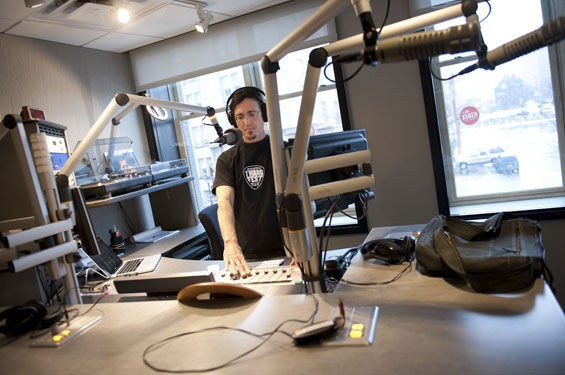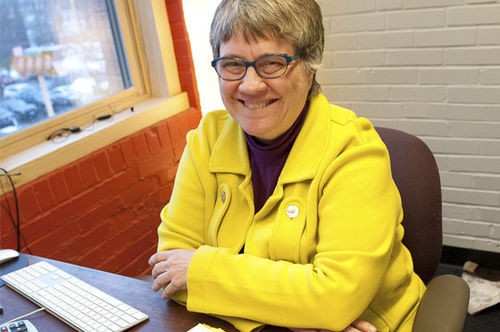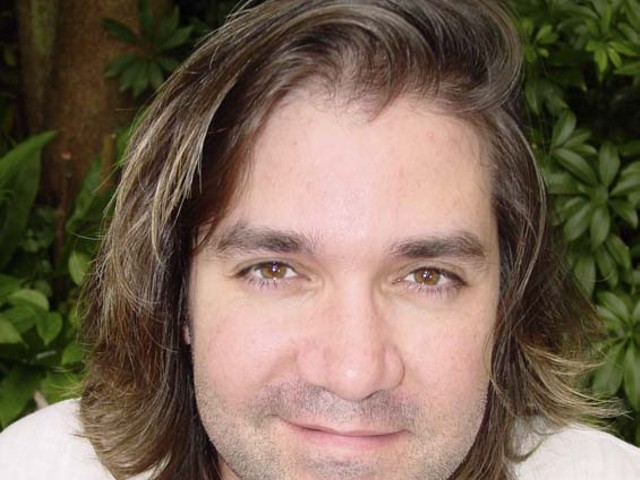
This Monday, May 25, will be the last time to hear KDHX's handful of talk radio programs on the air -- after that, they will be converted to podcasts.
It's the latest step in an ongoing move toward music-only programming for St. Louis's 28-year-old community radio station. Six years ago, KDHX took most of its talk radio programs off the air, including St. Louis Poet Laureate Michael Castro's Poetry Beat and the syndicated Democracy Now. Four remaining shows -- Earthworms, Literature for the Halibut, Collateral Damage and Collector's Edition, which is about half music and half band interviews -- were stacked together on Monday night. Some were shortened.
Now they'll be podcast only, not broadcast.
According to Chief Engagement Officer Kelly Wells, the decision was fully supported by the programming committee, which includes Executive Director Beverly Hacker, another paid staff member who also has a show, and four programmers.
"Over the years, KDHX has evolved into primarily a music station," Wells explains. "Our talk shows, which air on Monday evenings, have consistently shown decreasing listenership over the years."
Many programmers at the station, though, believe that if listenership has decreased, it's because shows were shortened by half, stacked together and put in a difficult time slot.
In the last few days, 30 music programmers have signed a petition to keep the talk radio shows on air.
"This is a broad-based group of music programmers," says Ron Edwards, host of Nothin' But the Blues. "Rock, blues, bluegrass, hip hop -- practically everybody on the radio is signing this petition. It's not just old-timers or the spoken word people. All these people are music people and they support the spoken word people and think we can be more than just music."
See also: KDHX's New Grand Center Headquarters Expand the Station's Profile
Edwards has been with the station since its December 1987 beginnings, making him one of four original programmers left at the station. "KDHX has had a talk radio element since the earliest shows," he says. "Jean Ponzi [host of Earthworms] has produced over 1,200 programs."
Ann Haubrich, who has hosted Literature for the Halibut for almost 25 years, believes that the move marks a dramatic departure from the original vision for KDHX and even its mission statement, which states that the station's goal is to "build community through media, with diverse and independent voices that enrich the perspectives of our audiences. We promote civic and cultural participation by providing the tools, technology, and training vital to informed, creative expression."
"If you look at the mission statement," she says, "talking about community, civic and cultural participation, and diverse voices, you'd think we are a talk radio station."
She adds, "I think KDHX is a great institution and cultural treasure. The talk shows add value to the community radio station. It's clear that the informational and cultural talk shows fulfill the mission of KDHX and best do so by remaining on the air, through live broadcast. It will be difficult to 'promote civic and cultural participation' to a self-selected audience" -- meaning people who seek out the programming through podcast.
M.K. Stallings, another host of Literature for the Halibut and founder of UrbArts in Old North St. Louis, thinks it might be simpler to change the mission statement. "This is supposed to be independent radio, but the move to go to an all-music format indicates that they're looking more like a commercial radio station."
The move does bring into question how an all-music format can be diverse and demonstrate civic and cultural participation. Stallings believes the station continues to show some diversity, but questions how an all-music format can facilitate civic and cultural participation.
"I think KDHX is diverse in terms of walks of life represented," Stallings says of the station's DJs and volunteers. "In terms of musical genres, they've demonstrated that. But to take away our on-air presence diminishes diversity and diminishes our reach. And that's cool. Just be honest about it."
Wells, though, says the answer is in podcast technology.
"By using a subscription model, podcasting allows listeners to have the programs they are interested in delivered to them as they are produced," she says, "taking the concept of appointment listening to a much higher level and allowing producers to get their shows directly to the people who care about the programming."
As the success of podcasts like Serial demonstrates, national podcasts have tremendous potential -- possibly including syndication.
"Podcasts," Wells says, "are exploding across the country, with programs covering all kinds of topics of interest to niche audiences. As always, our goal is to stay relevant to our audiences and adapt to the new and changing media landscape. We're excited to have veteran show hosts and established radio shows to lend their expertise to KDHX's largest foray into the podcast world. More and more people are getting information and learning about new things through podcasts and the platform allows us to reach people in the most accessible way, with information and education that is of particular appeal to them. We see this as a huge area for growth and plan to add new and different podcasts in the coming months."
Currently, KDHX's podcasts are difficult to find on its website. It's easier to find them via Google than by searching kdhx.org. If podcasts are a new source of growth for the station, will that change? And does KDHX intend to charge for podcast subscriptions? The station hasn't said.
Some hosts question whether KDHX has to pull talk programs off the air in order to grow its podcast presence.
"All the things they say is possible with podcast is possible now. We already do that," responds Stallings. "I'd rather have some lively and engaging live conversations with writers in town, in the area, and nationally." No other radio station in town has a live on-air program dedicated to the literary arts and culture or environmental issues.
Ron Edwards believes few people will listen to the podcasts, and not just because they're difficult to find on the station's website. More importantly for Edwards and other programmers, the podcasts will eliminate older listeners.
"When you take people off the air, you eliminate the people who are older, who don't use podcasting, who don't use this technology," Edwards says. "I don't listen to podcasts. It also eliminates people who only listen in the car, people driving home from work. But it will potentially eliminate the older audience. That's a real concern."
Ann Haubrich believes the real issue is money. Her show always made its pledge goals, she says, but she can't help but think about an April 9 meeting she had with Executive Director Beverly Hacker, in which Hacker explained that the station was "thinking" of moving the talk shows from broadcast to podcast.
When Haubrich asked about the bottom-line reasoning behind this move, she says Hacker answered with one word: revenue.
"And," Haubrich continues, "she followed up the one-word answer with saying it was also about 'listeners' and the 'circle of engagement' and that when listeners tuned in on Monday nights not getting the music they expected to hear, we are essentially 'flushing the audience.'"
Wells insists the decision has nothing to with money. "Fundraising was not considered in the decisions to move the talk shows to podcast," she says. "Fundraising does not come to bear on decisions regarding any radio show on KDHX either currently or historically. On-air fundraising efforts from each show host fully support KDHX as a whole."
Haubrich, whose show has focused for more than two decades on local and national literary arts, keenly feels a sense of loss.
"I keep thinking about the random listener," she says. She's thinking of someone who has never heard the show before and happens to tune in on the car radio, hear a segment about, say, poet Philip Levine, who recently died, and call in to say how much he appreciated it. "We won't be able to reach that guy in a podcast."
Richard Newman's most recent poetry collection is All the Wasted Beauty of the World (Able Muse Press, 2014). He has served as editor of River Styx for 20 years and teaches creative writing as an adjunct at Washington University. Newman has appeared on many KDHX shows over the years--both on behalf of River Styx, as a poet in support of new books, and also as a member of various bands. KDHX, and through Kelly Wells in particular, has also sponsored, not financially but with airtime, River Styx's Big River Writers Conference.






